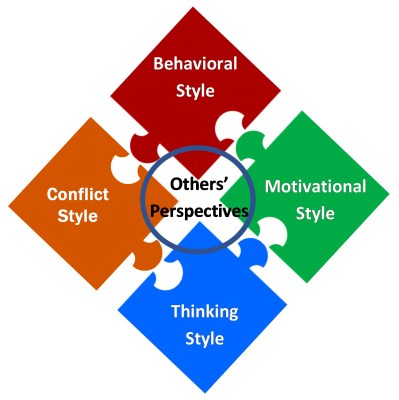Assessments

Assessments
A number of assessment tools are available for coaching clients, including four core assessments plus 360-degree feedback that brings in colleagues’ perspectives and measurement of emotional intelligence. Each assessment focuses on a different area of behavior and/or thinking. Used alone or in combination with one another, they can provide insights that support the growth you seek through coaching.

DiSC – Identifying Behavioral Styles
One of our most popular assessments for individuals and teams, DiSC identifies your preferred behavior to interact with your environment and others. It provides a universal language to increase understanding of behavioral styles. This can improve communication and increase understanding of yourself and colleagues.

Thomas Kilmann (TKI) – Identifying Conflict Styles
The TKI provides insight into typical responses to conflict situations using one or more of five conflict-handling modes: competing, collaborating, compromising, avoiding, and accommodating. Useful for both individuals and teams, understanding of these modes reflects varying levels of assertiveness and cooperation and can lead to more constructive conflict and better results.

Driving Forces – Identifying Motivational Styles
Where DiSC indicates ‘how’ someone is likely to behave, Driving Forces identifies ‘why’ we do what we do. This tool describes the aspects of life that energize you, things you perceive as important, and thoughts that provide you with purpose and direction in life.

Judgment Index/Acumen – Identifying Thinking Styles
Available in two versions, this assessment looks at problem solving skills and ability to avoid blind spots associated with situational bias. Presented in terms of how you see the world and yourself through various lenses, the insights gained from this assessment increase self-awareness and understanding that can lead to greater performance.
360 Degree Feedback – Identifying Others’ Perspectives
In addition to the assessments mentioned above, a tool that gathers feedback from your boss, colleagues, and direct reports (360 degrees around you, the leader) can be valuable on many levels. Other people generally see us more objectively than we see ourselves. The input collected through brief interviews or via an online assessment serves as a catalyst for further development of you as a leader. As with other assessments, the results help you identify where the highest impact behavioral changes are most likely to support your professional goals.
Emotional Intelligence (EQ) – Understanding Emotional iQ
For those interested in increasing their emotional intelligence, the EQi helps you understand the correlation between the way you apply your emotional intelligence and the outcomes of your interactions with others. It can be administered as a self-assessment alone or as part of a 360. The knowledge gained can lead to improved decision making, greater understanding of the impact you have on others, better leadership, and stronger engagement.

